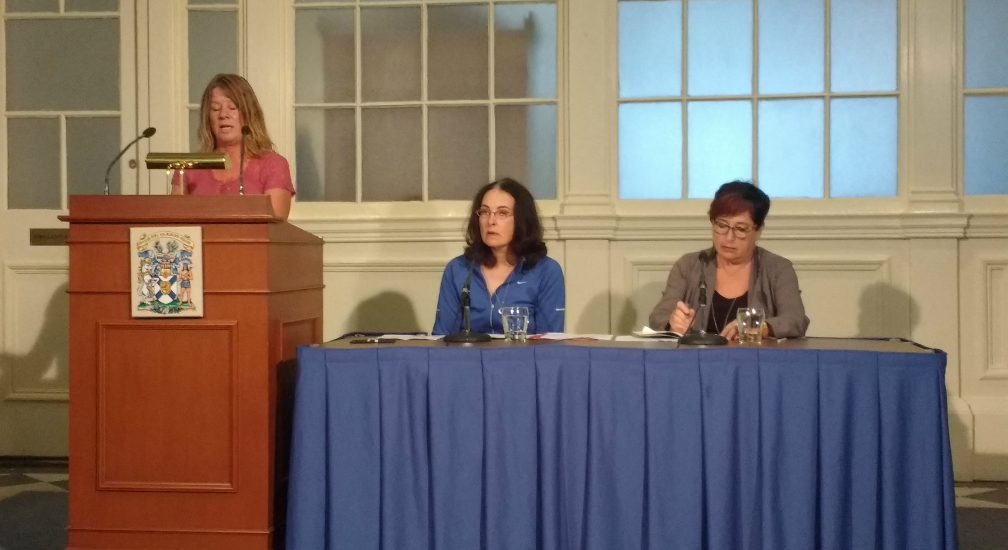
KJIPUKTUK (Halifax) – Last week a Nova Scotia Human Rights Commission Board of Inquiry decided that former firefighter Kathy Symington did not suffer discrimination while working at the Halifax Fire Service. HRM had fought Symington for years about the discrimination she encountered, while she was a Halifax firefighter.
Symington started her career at the Halifax Fire Service in 1997, one of a handful of women. As a full time firefighter, she was also a member of Local 268 of the International Association of Firefighters (IAFF).
Symington’s case needs to be seen in light of the case of former firefighter Liane Tessier. That case was resolved in Dec. 2017 — 12 years after it began. Tessier had to take the Commission to the Nova Scotia Supreme Court, which ordered the Human Rights Commission to reconsider her case.
Tessier and the Fire Service settled the case in advance of a public Board of Inquiry. Tessier not only demanded and received a public apology from the Fire Service, she also received a public apology from the Human Rights Commission for its original denial and delay of her case.
Tessier forced the Fire Service and Halifax Regional Municipality to agree to numerous changes inside the Fire Service to promote women’s equality and eliminate sex discrimination.
However, by far the most important victory won in the Tessier case was the Fire Service’s and HRM’s admission that there was systemic gender discrimination in the Fire Service.
Systemic means the discrimination runs through the whole system. Given this admission, why was the systemic discrimination never addressed in Symington’s human rights case? Why was systemic discrimination — a pattern of behaviour, policies or practices in the Fire Service which created serious disadvantage for women– not also applied to the Symington case?
In 2002, Symington launched her first human rights complaint at the NS Human Rights Commission against the Halifax Fire Service and the union.
She said they discriminated against her on the grounds of her sex. Throughout her time in the Fire Service, she says she faced taunting, bullying, harassment, retaliation and limits on her career because she was a woman in a “man’s job.” She was verbally and physically attacked on the job.
Among the incidents she described were these:
- In 2002, her vehicle was vandalized three times. Management knew the culprit (another firefighter) and refused to take any action
- A high ranking member of the Fire Service sexually harassed her.
- She did not get paid for 8 weeks when she was off sick due to an “oversight.”
- She worried about how safe she was on the job because of these and other incidents.
The Human Rights Commission dismissed all of these accusations at the administrative stage and did not refer her first complaint to a Board of Inquiry.
Ten years later, after Tessier had forced the Commission to reconsider her case, Symington filed another complaint. It was only after Equity Watch held a demonstration in April 2018 in front of the Commission’s office and a media conference in September to demand a public Board of Inquiry, that the Commission finally agreed to it.
At the Board of Inquiry into the second complaint, Symington’s case hinged on disability discrimination. Years before, Symington had suffered a serious injury in a car crash and, after surgery and sick leave, required accommodation by her employer. In 2012, a functional ability test revealed she could no longer work as a firefighter. However HRM took more than three years to accommodate her with a job she could do either within the Fire Service or in HRM.
HRM’s failures in accommodating female firefighter Symington are in stark contrast to HRM’s accommodation of the ex-police officer Chris Mosher. For Symington however – who broke no laws – HRM took its own sweet time to find her an alternative position. By that time, her condition had deteriorated and she could not do that job. She claimed the delay in accommodating her was due in part to retaliation because of her first complaint to the Commission; she also gave evidence that gender was a factor.
The real issue is this: here we have a career firefighter, a woman who spent nearly 20 years in faithful service to the Halifax Fire Service. Because she spoke out, because she is a woman, she faced taunts, ridicule and harassment. The Human Rights Commission dismissed her initial complaint in 2006.
Now too, her second complaint has been dismissed.
The sorry history of discrimination in HRM did not begin yesterday and will not stop tomorrow. In 2013, Black Firefighters in Halifax won their Human Rights complaint of racial discrimination. In May 2018, black HRM workers in Municipal Operations Programs (MOPS) picketed City Hall to demand action on a two-year-old confidential report that found anti-Black racism. That same month, mechanic YZ won his complaint of racial discrimination in Metro Transit and was awarded over $600,000 in damages the following year.
Amid all the forms of discrimination in HRM, discrimination against women may be the most intractable, due to the paucity of women in most “business units”. According to an HRM report, in 2017-18, 92.9% of Halifax firefighters were men; women accounted for only 7%.
Looking at the bigger picture, in 2017-18 nearly 71% of all employees in HRM were men, and only 29% were women. In 2013-14, men were 70.6% of the HRM workforce and women were 29.3%. So HRM is going backward.
In fact the Tessier case shows that for a woman to complain about a male-dominated workplace, such as the Fire Service, the woman has to be willing to fight for more than a dozen years, has to have an airtight complaint, witnesses, and certainly not criticize her superiors. Short of this, women are simply not believed. They are considered troublemakers and out of line.
Can we dare to expect fairness and an end to discrimination for women in non-traditional jobs in HRM or, for that matter, anywhere?
Somehow I doubt it.
See also: 16 years, and still no justice. Firefighter tells NS Human Rights Commission to do the right thing
Judy Haiven is on the steering committee of Equity Watch, a Halifax-based organization which fights bullying, racism and discrimination in the workplace. You can reach her at equitywatchns@gmail.com
With a special thanks to our generous donors who make publication of the Nova Scotia Advocate possible.
Subscribe to the Nova Scotia Advocate weekly digest and never miss an article again. It’s free!



